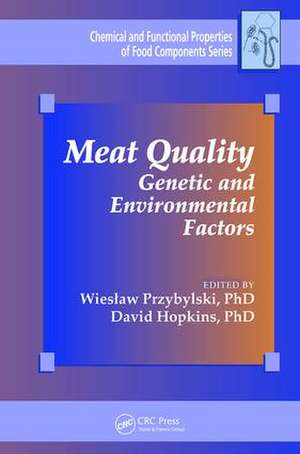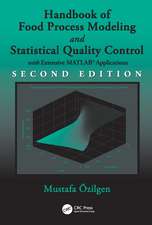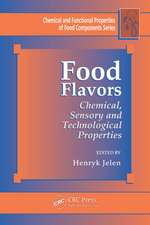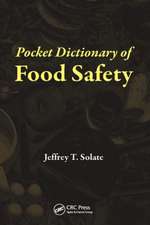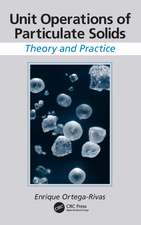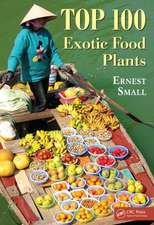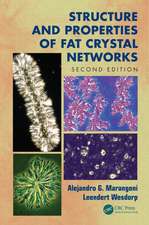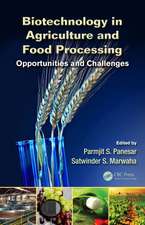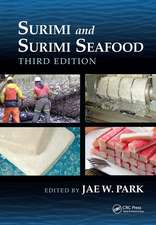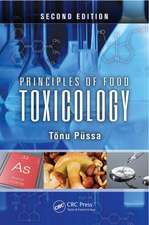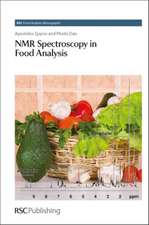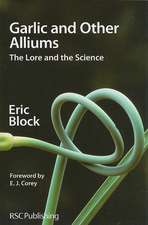Meat Quality: Genetic and Environmental Factors: Chemical & Functional Properties of Food Components
Editat de Wieslaw Przybylski, PhD, David Hopkins, PhDen Limba Engleză Paperback – 31 iul 2018
Meat Quality: Genetic and Environmental Factors covers key topics such as animal welfare, nutrition, pre-slaughter handling, slaughter technology, breeding strategies, and the influence of common genetic factors on meat quality. It also discusses the latest meat production systems designed to ensure high-quality meat and the role of transgenic animal technology in meat quality. The book devotes separate chapters to beef, pork, and sheep quality, looking at the effects of breed, genetic type, gender, and age on meat quality.
The chapters are written by contributors from universities, research institutes, and breeding companies from different countries and continents. The chapters are based on the research and teaching experience of the contributors as well as on a critical evaluation of the current literature.
No other book available today covers the key issues regarding meat quality in such a comprehensive way. This book should be of keen interest to students of food technology, nutrition, commodities sciences, and animal sciences, as well as to food scientists and engineers who want to update their knowledge about the determinants of meat quality.
| Toate formatele și edițiile | Preț | Express |
|---|---|---|
| Paperback (1) | 493.82 lei 6-8 săpt. | |
| CRC Press – 31 iul 2018 | 493.82 lei 6-8 săpt. | |
| Hardback (1) | 1802.50 lei 6-8 săpt. | |
| CRC Press – 19 oct 2015 | 1802.50 lei 6-8 săpt. |
Preț: 493.82 lei
Preț vechi: 685.42 lei
-28% Nou
Puncte Express: 741
Preț estimativ în valută:
94.51€ • 98.30$ • 78.02£
94.51€ • 98.30$ • 78.02£
Carte tipărită la comandă
Livrare economică 14-28 aprilie
Preluare comenzi: 021 569.72.76
Specificații
ISBN-13: 9781138894075
ISBN-10: 1138894079
Pagini: 488
Dimensiuni: 156 x 234 x 34 mm
Greutate: 0.9 kg
Ediția:1
Editura: CRC Press
Colecția CRC Press
Seria Chemical & Functional Properties of Food Components
ISBN-10: 1138894079
Pagini: 488
Dimensiuni: 156 x 234 x 34 mm
Greutate: 0.9 kg
Ediția:1
Editura: CRC Press
Colecția CRC Press
Seria Chemical & Functional Properties of Food Components
Public țintă
Professional ReferenceCuprins
Meat and Muscle Composition of Slaughter Animals. Meat Quality of Slaughter Animals. Conversion of Muscle to Meat. Impact of Animal Nutrition on Muscle Composition and Meat Quality. Terms of Farming and Animal Welfare and Meat Quality. Preslaughter Handling, Welfare of Animals, and Meat Quality. Stress Reactivity, Stress at Slaughter, and Meat Quality. Slaughter-Line Operations and Their Effects on Meat Quality. Breeding Strategies for Improving Meat Quality. Influence of Major Genes on Meat Quality. Beef Quality. Pork Quality. Sheep Quality: Effect of Breed, Genetic Type, Gender, and Age on Meat Quality. Transgenic Animal Technology and Meat Quality. Production of High-Quality Meat.
Notă biografică
Wiesław Przybylski is the professorial head of the Department of Food Gastronomy and Food Hygiene in the Faculty of Human Nutrition and Consumer Sciences at the Warsaw University of Life Sciences. He was vice dean for research for four years (2008–2012). He studied at the Pedagogical-Agricultural University in Siedlce and received a master’s in animal science. He earned a PhD in animal science and then completed a 10-month postdoc scientific practice at the Station of Research of Meat in Theix and at the Station of Quantitative and Applied Genetics in Jouy en Josas (near Paris) of INRA (the Institut National de la Recherche Agronomique) in France. He has authored 265 publications and 5 books for secondary schools and universities. His areas of research interest are the effect of environmental and genetic factors on meat quality, traditional foods, and applications of multidimensional statistical methods in food technology.
David L. Hopkins has two degrees from the University of Melbourne and earned his PhD at the University of New England focusing on biochemical mechanisms responsible for tenderization of meat. He worked for the Tasmanian Department of Agriculture for six years before moving into a newly created position with NSW DPI (Centre for Red Meat and Sheep Development). As a senior principal research scientist with a focus on meat science he has built a team of people, and currently supervises three technical staff, two scientists, and also supervises postgraduate students from around the world. He is the sole meat scientist in NSW DPI and has published extensively (more than 400 papers) on meat and carcass studies. He currently sits on the editorial board of two journals and is editor in chief of the journal Meat Science.
David L. Hopkins has two degrees from the University of Melbourne and earned his PhD at the University of New England focusing on biochemical mechanisms responsible for tenderization of meat. He worked for the Tasmanian Department of Agriculture for six years before moving into a newly created position with NSW DPI (Centre for Red Meat and Sheep Development). As a senior principal research scientist with a focus on meat science he has built a team of people, and currently supervises three technical staff, two scientists, and also supervises postgraduate students from around the world. He is the sole meat scientist in NSW DPI and has published extensively (more than 400 papers) on meat and carcass studies. He currently sits on the editorial board of two journals and is editor in chief of the journal Meat Science.
Descriere
This book covers factors affecting meat quality from the growth of animals to the final product. This comprehensive book covers key topics such as animal welfare, nutrition, pre-slaughter handling, slaughter technology, breeding strategies, and the influence of common genetic factors on meat quality.
